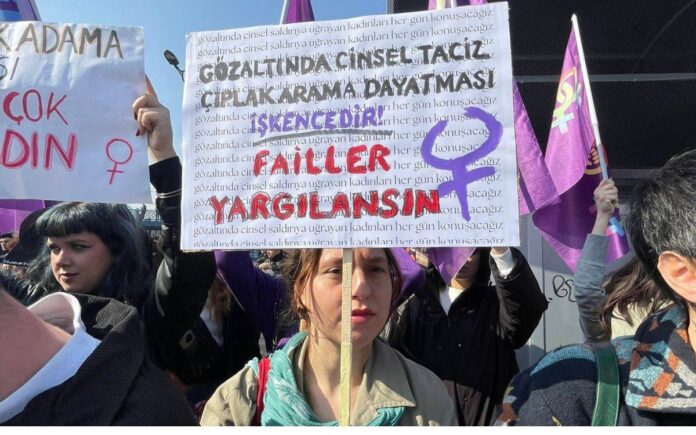Turkish lawyers said there was credible evidence that supported claims of unlawful strip-search, abuse and mistreatment by police during recent protests in İstanbul, the BBC Turkish service reported.
Protests swept across the country following the March 19 detention of Istanbul Mayor Ekrem İmamoğlu, with Interior Minister Ali Yerlikaya announcing that nearly 2,000 people had been detained during the demonstrations. Meanwhile, media reports have emerged featuring harrowing testimony from detainees, alleging unlawful strip-searches, sexual harassment and physical abuse while in custody.
Justice Minister Yılmaz Tunç dismissed these allegations, stating that Turkish authorities remain committed to a “zero tolerance for mistreatment” policy.
The first allegations of sexual harassment were raised by Republican People’s Party (CHP) deputy Sezgin Tanrıkulu. In a statement to the press, Tanrıkulu said a woman was subjected to beating and sexual harassment.
Lawyers from the İstanbul Bar Association confirmed the statement made byTanrıkulu, who also said he had seen marks of trauma on the bodies of people who had been detained, adding that there was physical abuse bordering on sexual harassment, particularly targeting young women.
In an interview with BBC Turkish, Kerim Bütün, a lawyer affiliated with the İstanbul Bar Association, revealed that at least two women detained during the protests reported being subjected to strip-searches.
Lawyer Tuna Soydemir said seven women had filed complaints about strip-searches with the Human Rights Center, established by the Ankara Bar Association.
According to a report seen by BBC Turkish, one woman told her lawyers that when they arrived at the detention facility, strip-searches were conducted. She claimed that they resisted the procedure and that female police officers tried to forcefully remove their clothes and held them by the throat in a way that made it hard to breathe.
Unlawful strip-search and sexual harassment in police detention have been longstanding problems in Turkey.
The European Court of Human Rights (ECtHR) has found strip-searches to constitute degrading treatment when not justified by compelling security reasons and/or due to the way they were conducted.
But the practice has been used frequently by Turkish security forces against people suspected or convicted of political crimes. Some of the women said the officers conducting the searches were laughing as they were undressing. Human rights defender and Peoples’ Equality and Democracy Party (DEM) lawmaker Ömer Faruk Gergerlioğlu says strip-searches are indeed conducted to humiliate detainees.
In one of the most highly publicized cases, 30 university studentsdetained in Uşak on August 31, 2020 on charges of links to the faith-based Gülen movement were subject to unlawful strip-searches. The women later described it as the most humiliating moment of their lives.
The Turkish government accuses the movement, inspired by Turkish cleric Fethullah Gülen, who passed away in exile in October, of orchestrating a coup attempt that took place on July 15, 2016. Gülen and the movement have strongly denied involvement in the failed coup or any terrorist activity.
The women later filed a formal complaint with the prosecutor, but their claims were mocked by ruling Justice and Development Party (AKP) deputies.
In addition to sexual abuse and strip-search, lawyers said physical abuse during police intervention in the recent İstanbul protests and later in detention was widespread.
Lawyers from various cities told BBC Turkish that, during the protests, demonstrators were severely beaten and injured due to police brutality. Even some individuals who did not resist the police and were attempting to disperse were also beaten and detained.
Tanrıkulu reported seeing young people in İstanbul with broken noses and bruises on various parts of their bodies.
The Ankara Bar Association’s Human Rights Center prepared a detailed report based on the complaints they received. According to the report, seen by BBC Turkish, one person was found to have a fracture after being run over by a water cannon (TOMA) during the protests.
Elif Yetigin, a lawyer from the Kocaeli Bar Association, also stated that during detentions, they observed instances of people being dragged on the ground, kicked, cursed at, struck on the head, and subjected to physical intervention that left visible marks.
Ahmet Ergin, a lawyer from the İstanbul Bar Association, reported that at least three detainees had broken bones, and he observed injuries on others, including to their eyes and other parts of their bodies. Ergin also confirmed that these allegations were recorded in medical examination reports and transcripts of testimony, and he said they would be sharing their report on the findings.
The Lawyer’s Voice Initiative, formed by lawyers from the İstanbul Bar Association, published a report on April 5 after meetings at İstanbul’s Silivri Prison. Lawyer Kerim Bütün, speaking about their interviews with detainees, said one woman had broken ribs, while a male detainee claimed at least eight police officers had randomly kicked and punched him after the lights were turned off in the bus taking him to the police station.
Human rights watchdogs such as Human Rights Watch (HRW) and Amnesty International said they take claims of mistreatment very seriously and have launched investigations.














